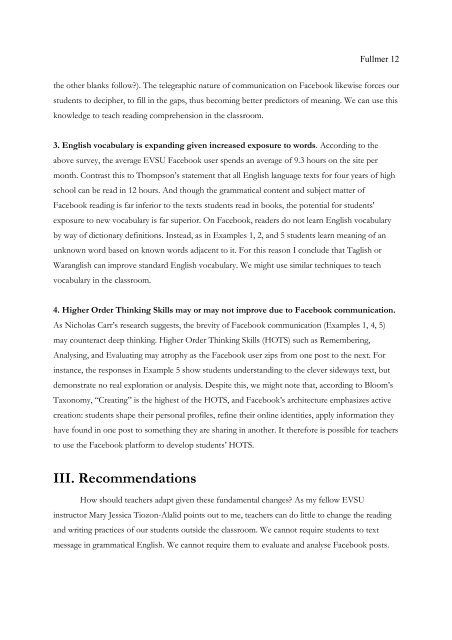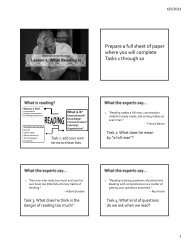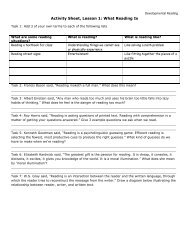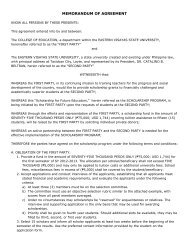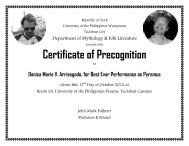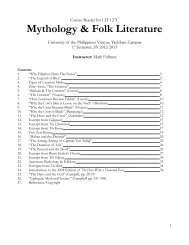Literacy in the Facebook Era - Waray Dictionary and Language ...
Literacy in the Facebook Era - Waray Dictionary and Language ...
Literacy in the Facebook Era - Waray Dictionary and Language ...
Create successful ePaper yourself
Turn your PDF publications into a flip-book with our unique Google optimized e-Paper software.
Fullmer 12<br />
<strong>the</strong> o<strong>the</strong>r blanks follow?). The telegraphic nature of communication on <strong>Facebook</strong> likewise forces our<br />
students to decipher, to fill <strong>in</strong> <strong>the</strong> gaps, thus becom<strong>in</strong>g better predictors of mean<strong>in</strong>g. We can use this<br />
knowledge to teach read<strong>in</strong>g comprehension <strong>in</strong> <strong>the</strong> classroom.<br />
3. English vocabulary is exp<strong>and</strong><strong>in</strong>g given <strong>in</strong>creased exposure to words. Accord<strong>in</strong>g to <strong>the</strong><br />
above survey, <strong>the</strong> average EVSU <strong>Facebook</strong> user spends an average of 9.3 hours on <strong>the</strong> site per<br />
month. Contrast this to Thompson’s statement that all English language texts for four years of high<br />
school can be read <strong>in</strong> 12 hours. And though <strong>the</strong> grammatical content <strong>and</strong> subject matter of<br />
<strong>Facebook</strong> read<strong>in</strong>g is far <strong>in</strong>ferior to <strong>the</strong> texts students read <strong>in</strong> books, <strong>the</strong> potential for students'<br />
exposure to new vocabulary is far superior. On <strong>Facebook</strong>, readers do not learn English vocabulary<br />
by way of dictionary def<strong>in</strong>itions. Instead, as <strong>in</strong> Examples 1, 2, <strong>and</strong> 5 students learn mean<strong>in</strong>g of an<br />
unknown word based on known words adjacent to it. For this reason I conclude that Taglish or<br />
Waranglish can improve st<strong>and</strong>ard English vocabulary. We might use similar techniques to teach<br />
vocabulary <strong>in</strong> <strong>the</strong> classroom.<br />
4. Higher Order Th<strong>in</strong>k<strong>in</strong>g Skills may or may not improve due to <strong>Facebook</strong> communication.<br />
As Nicholas Carr’s research suggests, <strong>the</strong> brevity of <strong>Facebook</strong> communication (Examples 1, 4, 5)<br />
may counteract deep th<strong>in</strong>k<strong>in</strong>g. Higher Order Th<strong>in</strong>k<strong>in</strong>g Skills (HOTS) such as Remember<strong>in</strong>g,<br />
Analys<strong>in</strong>g, <strong>and</strong> Evaluat<strong>in</strong>g may atrophy as <strong>the</strong> <strong>Facebook</strong> user zips from one post to <strong>the</strong> next. For<br />
<strong>in</strong>stance, <strong>the</strong> responses <strong>in</strong> Example 5 show students underst<strong>and</strong><strong>in</strong>g to <strong>the</strong> clever sideways text, but<br />
demonstrate no real exploration or analysis. Despite this, we might note that, accord<strong>in</strong>g to Bloom’s<br />
Taxonomy, “Creat<strong>in</strong>g” is <strong>the</strong> highest of <strong>the</strong> HOTS, <strong>and</strong> <strong>Facebook</strong>’s architecture emphasizes active<br />
creation: students shape <strong>the</strong>ir personal profiles, ref<strong>in</strong>e <strong>the</strong>ir onl<strong>in</strong>e identities, apply <strong>in</strong>formation <strong>the</strong>y<br />
have found <strong>in</strong> one post to someth<strong>in</strong>g <strong>the</strong>y are shar<strong>in</strong>g <strong>in</strong> ano<strong>the</strong>r. It <strong>the</strong>refore is possible for teachers<br />
to use <strong>the</strong> <strong>Facebook</strong> platform to develop students’ HOTS.<br />
III. Recommendations<br />
How should teachers adapt given <strong>the</strong>se fundamental changes? As my fellow EVSU<br />
<strong>in</strong>structor Mary Jessica Tiozon-Alalid po<strong>in</strong>ts out to me, teachers can do little to change <strong>the</strong> read<strong>in</strong>g<br />
<strong>and</strong> writ<strong>in</strong>g practices of our students outside <strong>the</strong> classroom. We cannot require students to text<br />
message <strong>in</strong> grammatical English. We cannot require <strong>the</strong>m to evaluate <strong>and</strong> analyse <strong>Facebook</strong> posts.


